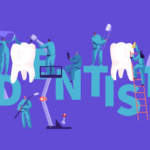Give Your Patients What They Want

If The Success Mantra In Real Estate Is Location, Location, Location…..The Mantra In Dentistry Should Be Relationships, Relationships, Relationships!
I agree relationships can be a buzzword, but I don’t feel you can get anything accomplished unless you put an effort into forming relationships. One of the reasons the concept feels like a buzzword is relationships can be somewhat superficial. So many people say they want to build strong and meaningful relationships but do not act like it.
Then there are relationships truly built on high trust and value. When you really connect with people, magic happens and things get done.
Connect with your Patients!
W only get to see many of them once or twice per year. I feel that the importance of relationships, particularly in healthcare, is about taking a genuine interest in people.
Treating patients as a case number sounds a little cliché, but it continues to happen.
Patients are people and want to be treated like human beings. I understand the need to be objective and impartial, but there’s also a need to be compassionate and understanding. We don’t need to separate these responses.
If you haven’t had a patient who has come in with preconceptions about dentistry and maybe some baggage, then you haven’t been a dentist for very long. Some patients have an acquired fear of being in a dentist’s chair. On the other hand, some patients show up positive and upbeat. The goal must always be about building rapport with either type of patient.
It starts with a conversation–a conversation which leads to learning interesting facts about each other and finding similarities. Trust is built through sharing and genuine interest.
At the beginning of every appointment with a new patient, have a chat and get to know them. I find out about their family, if they have children, what they do for work and things they like to do in their off-time. Here’s a tip. I also share it with them! My patients get a chance to get to know me, as well. I don’t think any professional today can go anywhere or accomplish any level of significance without this.
Here’s another tip. My assistant writes down what we learned about the patient in the chart, such as loves basketball, just got a motorcycle or going to Hawaii this winter with family. This leaves me with a point of reference and an ice breaker at our next visit. You’ll never get tired of hearing, “Wow, Doc, how did you remember that about me?!” Even if they don’t say it, and even if they know you took notes, they’ll still appreciate the effort, and it helps them connect to us.
Very little can be accomplished by the practitioner who only takes the authority level and issues treatments as if they are orders. You know what I am talking about. The outdated version where the doctor is the authority, the client is the patient and that’s it. I tell, and you do.
I couldn’t figure out why patients wouldn’t accept my treatment plans or rebook their appointments. When I started my career, I expected that after I explained all the science and used the correct technical terms, clients would be wowed by my brilliance and convert. All that did for my clients was confuse them, and a confused mind doesn’t buy.
It wasn’t until I figured out the product of the product. Why were patients really coming into my office? It wasn’t to have me work in their mouth, scraping their teeth and gums with dental tools. I needed to be the one who gave them what they wanted instead of trying to take from them what I wanted.
“You will get all you want in life, if you help enough other people get what they want.”
– Zig Ziglar
Whatever their reason for coming in that day, the one thing your patient wants is to have that part nurtured. They want painless, efficient dentistry that comes with longevity and does not break the bank. These are common traits among most clients. Most don’t know much about dentistry. They rely on what they do know and how we make them feel about it.
Whether the solution requires veneers, fillings or perhaps a root canal, patients need to trust us when we explain the procedures so they feel like they are getting the product of the product. It is your job to give them value through education so they can make an informed decision.
Product of the Product
When your clients agree to your treatment plans, they are buying what the plan will do for them—alleviate pain, maintain healthy teeth, improve their self-esteem, etc.




